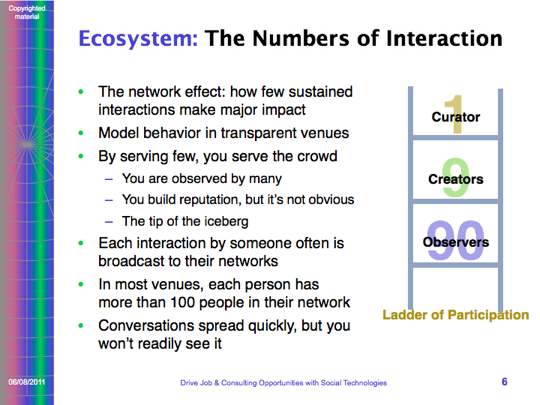 Backlash Against Google Plus Is Useful Criticism but Beware of Assumptions questions some key principles employed by pundits debunking Google Plus. Backlash Against Google Plus Is Useful Criticism but Beware of Assumptions questions some key principles employed by pundits debunking Google Plus.
Here is an excellent example of backlash against Google/Google+ from InfoWorld. This post shows how to 1) how to disconnect Google+ from Google search results and 2) configure your browser to default to non-Google search engines. Useful, but assumes 2 things that will be untrue for some people: a) Google+ results “pollute” search results in all cases; b) Yahoo/Bing give better search results. Although all of the above could be true in some cases, the devil is in the details. It is surprising that the post didn’t mention a much better alternative: info.com, whose algorithm sorts results from all three search engines.
Executive’s Guide recommends being aware of the ground shifting under search. Don’t get caught up in religious wars, and try different things. As we have argued in these pages here, Google+ results will enhance certain kinds of searches and will return inferior results in others. As infoworld says, users […]
 Everyone wants to know the secret sauce, how to build vibrant communities in digital social venues. Here is a question to a community manager to whom I responded recently in a gated enterprise forum. The question was, “What are some effective ways to improve circle count and follower engagement on google+?” Read on for some general pointers and references for further reading. Everyone wants to know the secret sauce, how to build vibrant communities in digital social venues. Here is a question to a community manager to whom I responded recently in a gated enterprise forum. The question was, “What are some effective ways to improve circle count and follower engagement on google+?” Read on for some general pointers and references for further reading.
[…]
WSJ Take on Google Plus Epitomizes Market Myopia and Opportunity reveals how conventional wisdom misunderstands Google+ and how to take advantage of the situation.

Most people have the whole “web 2.0 thing” sorted out by now. They have accounts in LinkedIn for business, Facebook for personal and Twitter for I-don’t-really-know-but-I’m-on-it. They also know that Google “doesn’t get social” as the search behemoth has littered carcasses of failed ventures around the web.
Alas, as I have argued here and in conference presentations since Google+ launched, this misunderstanding is completely understandable—and wrong. Most interesting here, it elevates opportunities and threats for market participants.
[…]
 Google Plus Disruptive Potential Reflected by Conference Audiences summarizes insights from audience reactions to Google+ presentations. CSRA launched the Executive’s Guide to Google+ because we thought it had significant disruptive potential for many of our clients, and our recent conference appearances (link to presentation below) have only underlined two of Google+’s unique attractions: your competitors don’t understand it and Google is managing it as a completely different animal, not a social network. Here I’ll share audience reactions to my recent Google+ presentations at public social business conferences and private corporate meetings. Google Plus Disruptive Potential Reflected by Conference Audiences summarizes insights from audience reactions to Google+ presentations. CSRA launched the Executive’s Guide to Google+ because we thought it had significant disruptive potential for many of our clients, and our recent conference appearances (link to presentation below) have only underlined two of Google+’s unique attractions: your competitors don’t understand it and Google is managing it as a completely different animal, not a social network. Here I’ll share audience reactions to my recent Google+ presentations at public social business conferences and private corporate meetings.
[…]
 Silicon Valley Watcher offers up a useful riff on disruptive potential of Google+ – but it nonetheless has glaring holes and reflects arbitrary assumptions. I recommend reading it to learn about this argument, which is based on this questionable logic: “social data degrades the ‘quality’ of search results.” Silicon Valley Watcher offers up a useful riff on disruptive potential of Google+ – but it nonetheless has glaring holes and reflects arbitrary assumptions. I recommend reading it to learn about this argument, which is based on this questionable logic: “social data degrades the ‘quality’ of search results.”
The real answer is far less satisfying, “It depends.” Some search results will be improved with social data while others won’t. Search, SEO/SEM and other players dislike Google+ when it disrupts their businesses. Expect, and listen to, these arguments, but realize that they are often biased.
Many employment or career-related discussions contain a feeling of gloom and doom, but I have noticed a paradoxical market development: that the unpredictable and volatile economy that affects all businesses and careers is actually driving more demand for expertise, but the demand doesn’t look the same to companies or workers. Here I’ll explain how this works, but even more important, I’ll give you some practical tips on using the market to your advantage (featuring social technologies).
[…]
Why Google Plus Should Be on Executives’ Radar explains Google’s new social network and why it commands attention; it changes the context of social networks.

The launch of Google’s new social network has poignant significance for executives—in predictable and surprising ways. Google+ is exceptionally significant because it is an exciting new social venue with the potential to disrupt, but even more important, it can teach us about how the ecosystem works and how organizations can learn to use it to garner support for things they care about. Here I’ll outline my first impressions and give general guidance for executives to take advantage of Google+’s potential.
[…]
Must read post speculating on whether Google will integrate Google+ with Docs to make an enterprise play, disrupting Yammer, Socialtext and other lightweight social enterprise players. This is exactly how to think and why most people miss the true significance of Google+: it’s a social infrastructure into which users will be able to plug many of their other Web activities (such as using Google Docs, Gmail, Payments, etc.). This makes it far more significant that "another social network." Thx @jowyang #fb […]

Most of us are familiar with Forrester’s Ladder of Participation, but using it to build engagement and community still escapes most individuals and organizations, so here I’ll offer a short treatment within the context of Facebook [click graphic right to enlarge]. The profound insight is that 90% of people in a social venue observe without interacting. 9% are the creators, they tweet, blog and make themselves known. 1% are curators, they sort and categorize content. Whether you are on LinkedIn, Facebook or authoring a blog, you only hear 10% of the people, but you are affecting 100% of the people. If you don’t know that, you might think your online activities were going unnoticed. Now I’ll turn to how this works in Facebook.
[…]
 The Future of Location: Josh Williams, CEO Gowalla is a glimpse into his crystal ball, given at SxSW 2011. Josh Williams shared his insights about geosocial at this South by Southwest 2011 session as well as his thoughts about how to approach it to serve customers better. Williams was passionate about orienting geosocial functions around storytelling and travel, which he illustrated by describing Gowalla’s approach to adding value. The Future of Location: Josh Williams, CEO Gowalla is a glimpse into his crystal ball, given at SxSW 2011. Josh Williams shared his insights about geosocial at this South by Southwest 2011 session as well as his thoughts about how to approach it to serve customers better. Williams was passionate about orienting geosocial functions around storytelling and travel, which he illustrated by describing Gowalla’s approach to adding value.
[…]
|
|
 Backlash Against Google Plus Is Useful Criticism but Beware of Assumptions questions some key principles employed by pundits debunking Google Plus.
Backlash Against Google Plus Is Useful Criticism but Beware of Assumptions questions some key principles employed by pundits debunking Google Plus.
 Everyone wants to know the secret sauce, how to build vibrant communities in digital social venues. Here is a question to a community manager to whom I responded recently in a gated enterprise forum. The question was, “What are some effective ways to improve circle count and follower engagement on google+?” Read on for some general pointers and references for further reading.
Everyone wants to know the secret sauce, how to build vibrant communities in digital social venues. Here is a question to a community manager to whom I responded recently in a gated enterprise forum. The question was, “What are some effective ways to improve circle count and follower engagement on google+?” Read on for some general pointers and references for further reading.
 The Future of Location: Josh Williams, CEO Gowalla is a glimpse into his crystal ball, given at SxSW 2011. Josh Williams shared his insights about geosocial at this South by Southwest 2011 session as well as his thoughts about how to approach it to serve customers better. Williams was passionate about orienting geosocial functions around storytelling and travel, which he illustrated by describing Gowalla’s approach to adding value.
The Future of Location: Josh Williams, CEO Gowalla is a glimpse into his crystal ball, given at SxSW 2011. Josh Williams shared his insights about geosocial at this South by Southwest 2011 session as well as his thoughts about how to approach it to serve customers better. Williams was passionate about orienting geosocial functions around storytelling and travel, which he illustrated by describing Gowalla’s approach to adding value.